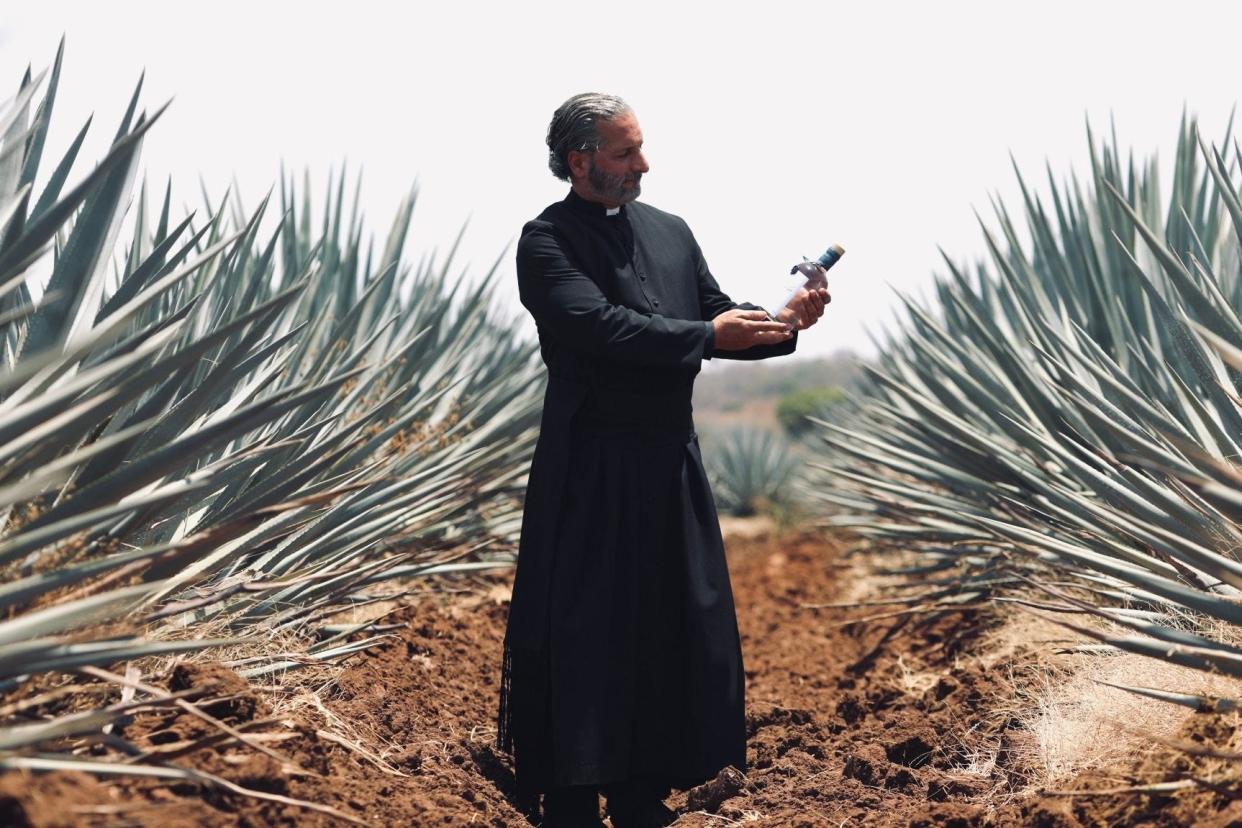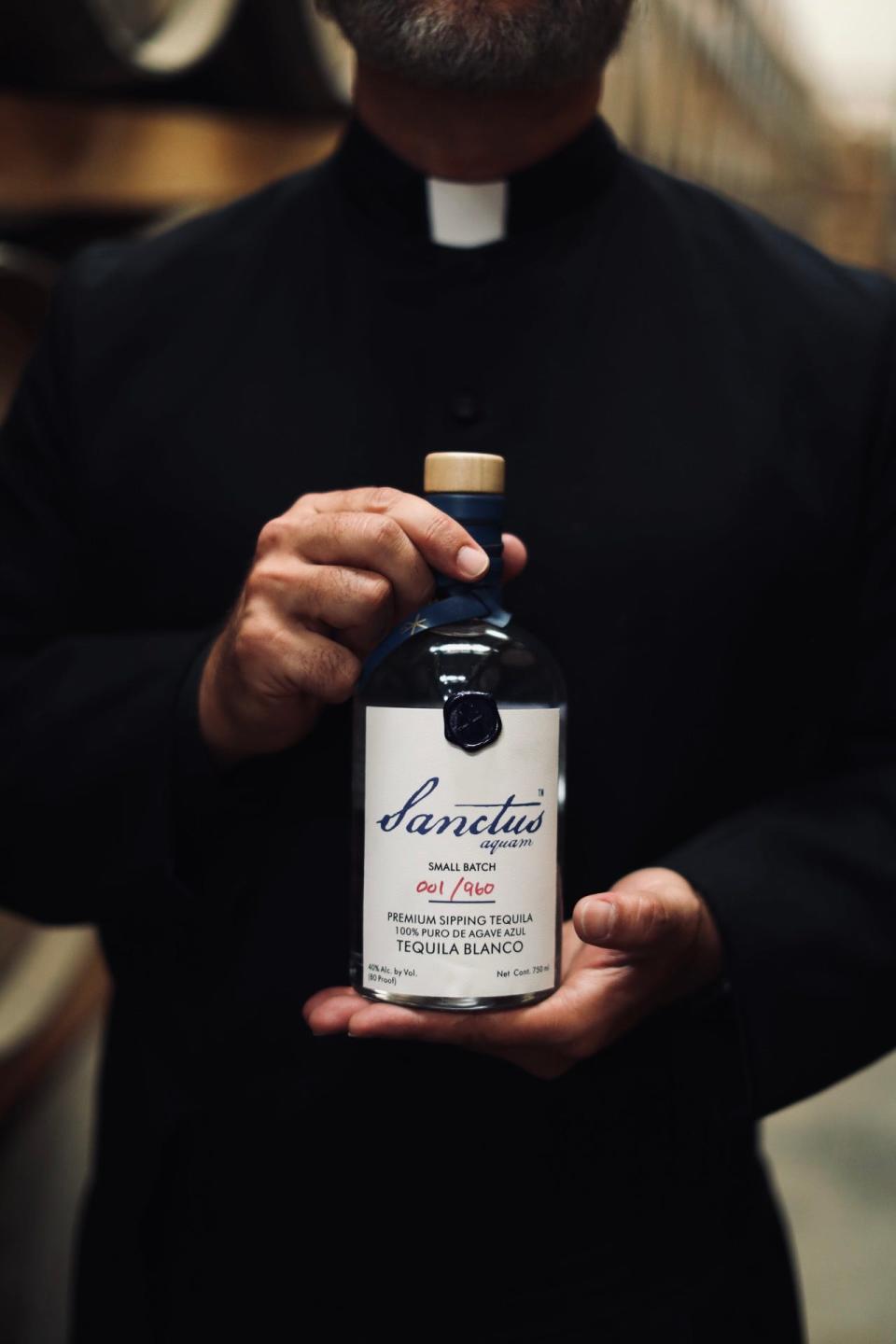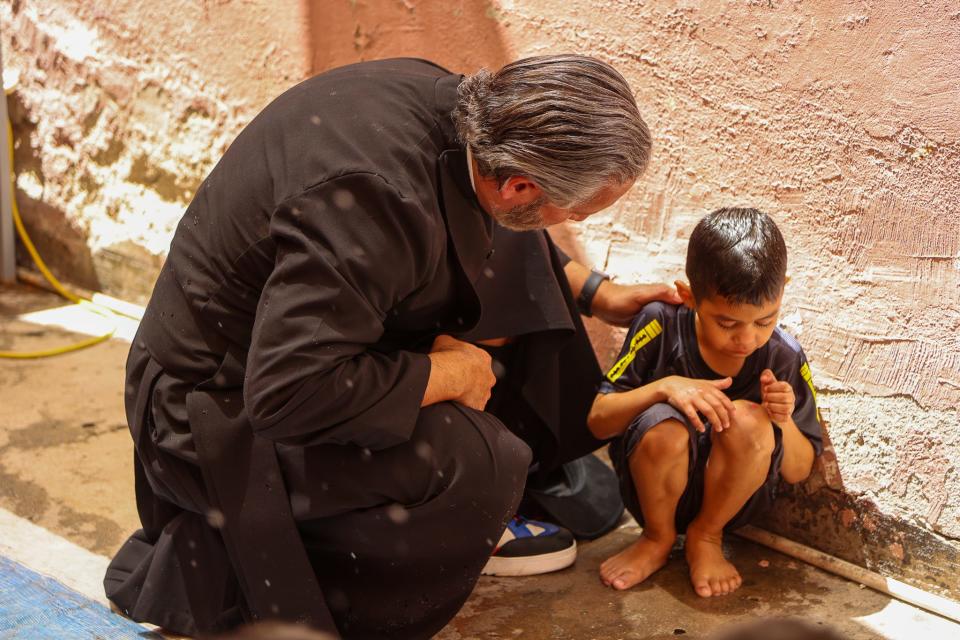Local Episcopal priest creates tequila to benefit children's shelters in Mexico

There’s a legend that local Episcopal priest Rev. Lorenzo Lebrija has heard many times — it dates back to 1922 and involves a priest in Jalisco, Mexico, who struggles to keep an orphanage afloat until he inherits a tequila factory.
He remembered this story while he and his husband, Troy Elder, were in Mexico almost two years ago, where they support a shelter for children in Mexicali and an orphanage in Tijuana. The shelter’s power was turned off for two weeks and Elder said, “I wish we could just drink their problems away.”
“I thought, ‘Hold on, maybe we can,’” Lebrija said.
According to the tale of the priest and the tequila factory, an affluent American woman savors the product and wishes to take a batch home, but it’s during the era of prohibition. The priest consecrates the tequila and labels it as “Sanctus Aquam” (holy water) so she can take it across the border. She introduces it to other affluent Americans who also purchase it under its rechristened name and the profits save the orphanage.
This legend inspired Lebrija to create his own tequila with the proceeds going to children’s shelters in Mexico.
Over the course of 16 months, Lebrija produced a flavor profile for a sipping tequila and took it to the Jalisco manufacturer, Tequila Selecto de Amatitán.
Lebrija branded the tequila Sanctus Aquam. In July, 960 bottles priced at $89.99 went on sale through sanctustequila.com. He hopes to release the same amount of bottles every quarter, raising $120,000 a year for children's shelters in Mexico.

"The whole point of this is to raise money for the kids," Lebrija said. "There isn't one salary in any of this. I have my job and get paid for my job. The importer has forfeited any fees and I only have to pay taxes to the federal government. Everyone helping me along the way realizes this is for a good cause and helping kids, so when we say 100% of the profits, we literally mean it."
With only 960 bottles per batch, it limits the opportunity to put the tequila in local restaurants and bars. There's a QR code on every bottle that explains the story of the tequila and its mission, which Lebrija doesn't want to lose.
"Maybe we do it with coasters. If you're going to serve this liquor, you could use this coaster that has a QR code so the (customer) sees the story," Lebrija said.
It's not the first time a priest has sold liquor for self-sufficiency or a charitable cause. Benedictines are known for making wine, bourbon, liqueurs and beer. The recipe for the French liqueur Bénédictine D.O.M. was created in 1510 by Benedictine monk Don Bernardo Vincelli.
"If you think of holy water as an instrument to carry God's grace, then is this tequila not an instrument to carry God's grace to a population that's on the margins and forgotten?" Lebrija said. "In that way of looking at it, then it is holy water. Just because it's not the holy water we think about used in churches or to bless people, it is holy in the sense of what it's meant to do."
A lifelong calling to be a priest
Lebrija said the story of what led him to the priesthood "depends on who you ask" but he felt a lifelong calling to the priesthood. His mother often tells a story of him at 4 years old celebrating mass in Latin in the family bathroom by placing a cloth over the lid of the toilet and using it as an altar.
He earned a Bachelor of Arts and Master of Business Administration from Florida International University and was president and CEO of Seraphic Fire and Firebird Chamber Orchestra in Miami, but decided to enter seminary at 39.
"I always saw the world through spiritual glasses. I would see the pain of the world, the joys of the world and all these other things. I'm influenced by my faith and it's at the core of who I am as a person," Lebrija said. "When I became a priest 8 years ago, that was the greatest joy I've ever felt in my life. I wish I actually did it when I was younger. On the other hand, I wouldn't be the person I am and all my experiences have led me to the priest I am today."

On occasion, Lebrija serves as visiting clergy to Church of St. Paul in the Desert in Palm Springs, but being a rector or serving at just one church has never appealed to him.
Insitead, Lebrija serves as the Chief Innovation Officer of the Virginia Theological Seminary and is founding director of TryTank, an experimental lab for church growth and innovation. During COVID-19, the organization provided "Ministration at the Time of Death" over the phone and made their website Dial-A-Priest available to hospitals around the country. He also interviewed Episcopal Church Presiding Bishop Michael Curry for the podcast "What is the Way of Love?"
"I actually miss the altar," Lebria said. "That is one quarter of being a priest in the parish, leading people in worship. That's a true gift and there's such a holiness to the moment, like when I'm doing the Eucharist prayer and calling down the holy spirit, I can almost see Jacob's Ladder of the angels bring our concerns up to God and bringing God's grace. It's a palpable feeling in that space at that exact moment I miss."
Lebrija doesn't want anyone to think of him being sacrilegious for making and selling tequila — he takes his vows and his work in the church seriously and looks at the end results of being able to provide children living at shelters in Mexico with basic needs and the opportunity to go to school.
"We need to get past the age of just giving money and thinking 'my conscience is clear, I've given money' and think about being called to a sense of community and a relationship with other people, and that's important too," Lebrija said.
Brian Blueskye covers arts and entertainment for the Desert Sun. He can be reached at brian.blueskye@desertsun.com or on Twitter at @bblueskye.
This article originally appeared on Palm Springs Desert Sun: Local Episcopal priest creates tequila to benefit children in Mexico

